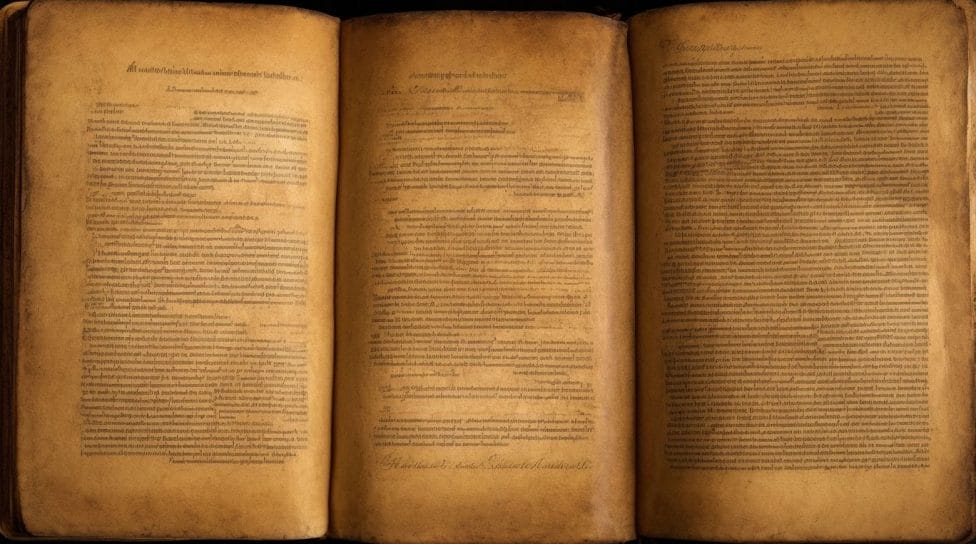Table of Contents
Add a header to begin generating the table of contents
The reliability of the Bible has been a topic of scholarly debate and scrutiny for centuries. However, several factors contribute to its credibility and trustworthiness. Examining the historical accuracy, archaeological evidence, cultural and manuscript consistency, prophecies and their fulfillment, eyewitness testimonies, and the enduring impact of the Bible provides insights into why it is considered reliable and authoritative.
The historical accuracy and archaeological evidence surrounding the events and accounts mentioned in the Bible are significant supporting factors. From the mentions of historical figures and events to the discovery of artifacts and inscriptions, archaeology has provided corroborating evidence for the Bible’s historical accuracy.
Cultural and manuscript consistency is another aspect that bolsters the reliability of the Bible. The consistency observed across different biblical texts, despite being written by various authors over centuries, is remarkable. Furthermore, external historical and cultural records align with many aspects of the biblical accounts, strengthening their credibility.
The Bible contains numerous prophecies, both in the Old and New Testaments, which have been fulfilled. The accurate predictions about specific events and individuals, especially concerning Jesus Christ, provide evidence of divine inspiration and add to the reliability of the Bible.
Eyewitness testimonies play a crucial role in establishing the Bible’s reliability, particularly in the New Testament. The accounts of individuals who directly witnessed the life, teachings, death, and resurrection of Jesus Christ add credibility to its narrative. Early manuscripts of the Bible, some dating back to the first century, provide further evidence of its authenticity and accuracy.
The enduring impact of the Bible on Western civilization is undeniable. Its teachings and principles have profoundly influenced laws, ethics, literature, art, and societal norms. The survival of the Bible throughout history and its translation into numerous languages demonstrate its enduring significance and wide-reaching appeal.
Considering these factors, it becomes clear why the Bible is regarded as a reliable and influential text. Its historical accuracy, archaeological support, cultural and manuscript consistency, fulfilled prophecies, eyewitness testimonies, and enduring impact all contribute to its credibility and reliability.

In a similar tone, consider the story of the discovery of the Pool of Siloam in Jerusalem. In 2004, archaeologists uncovered the ancient pool mentioned in the Gospel of John. This remarkable find not only confirmed the historical accuracy of the biblical account but also allowed visitors to walk in the footsteps of Jesus.

This consistency with external historical and cultural records enhances the credibility of the Bible as a reliable historical document.



Key takeaways:
- Historical accuracy and archaeological evidence: The Bible has been validated by historical accounts and archaeological discoveries, supporting its reliability as a source of historical information.
- Cultural and manuscript consistency: The consistency of the biblical texts across different versions and their alignment with external historical and cultural records further enhance the Bible’s reliability.
- Prophecies and fulfilled predictions: The presence of accurate prophecies, especially those regarding Jesus, showcases the Bible’s reliability as a divine text that accurately predicts future events.
Historical Accuracy and Archaeological Evidence

Photo Credits: 777Legion.Com by Alan King
Step into the world of historical accuracy and archaeological evidence as we delve into the intriguing realm of the Bible’s reliability. Get ready to uncover fascinating historical accounts and events, along with jaw-dropping archaeological discoveries that shed light on the truth behind ancient biblical narratives. Brace yourself for an eye-opening exploration that will challenge perceptions and ignite a deeper understanding of the Bible’s authenticity. Get ready to embark on a journey through time, where the past comes alive through the lens of historical accuracy and archaeological evidence.Historical Accounts and Events
Historical accounts and events provide crucial evidence for assessing the reliability of the Bible. By examining both historical accounts and archaeological discoveries, we can gain a deeper understanding of the accuracy and authenticity of biblical events.| Historical Accounts | Archaeological Discoveries |
| Accounts from contemporary historians such as Josephus and Tacitus confirm the existence of biblical figures and events. | Archaeological findings such as the Dead Sea Scrolls and the Tel Dan Stele provide tangible evidence of biblical stories and characters. |
| Primary sources like the New Testament Gospels offer eyewitness testimonies of Jesus’ life, death, and resurrection. | Excavations of ancient cities like Jerusalem and Jericho confirm the historical accuracy of biblical narratives. |
Archaeological Discoveries
Archaeological discoveries are of utmost importance in evaluating the credibility of historical accounts. These findings serve as tangible evidence that supports or questions the accuracy of historical events. They play a crucial role in corroborating the details mentioned in ancient texts and shedding light on the various cultures and civilizations of the past. A recent example of this is the artifacts uncovered during excavations in Egypt, which unquestionably validate the biblical narrative of Joseph’s ascent to power. These remarkable discoveries not only affirm the historical veracity of the Bible but also greatly contribute to our comprehension of the ancient world and its associations with contemporary society. Thus, archaeology breathes life into history.Cultural and Manuscript Consistency

Photo Credits: 777Legion.Com by Nicholas Lee
When it comes to understanding the reliability of the Bible, we can dive into the fascinating realm of cultural and manuscript consistency. Within this exploration, we will uncover intriguing insights about the consistency found across different biblical texts, as well as its alignment with external historical and cultural records. Prepare to be captivated by the depth and coherence that links the Bible to a rich tapestry of human history and cultural heritage.Consistency Across Different Biblical Texts
When evaluating the reliability of the Bible, one key aspect to consider is the consistency across different biblical texts. Here are some important points to keep in mind:- Corroborating Accounts: It is noteworthy that multiple books of the Bible often provide complementary information and perspectives on historical events, further strengthening their reliability.
- Harmony of Teachings: An important indication of the Bible’s reliability is the alignment of messages and teachings conveyed in different biblical texts. This harmony demonstrates a unified and consistent message throughout.
- Theme Continuity: The presence of common themes and motifs that can be traced throughout the entire Bible adds to the coherence and consistency of its content.
- Accuracy in Prophecies: It is remarkable that prophecies mentioned in different biblical texts align with each other, showing a high level of consistency in the fulfillment of these predictions.
Consistency with External Historical and Cultural Records
The consistency of the Bible with external historical and cultural records is a crucial factor in evaluating its reliability. This can be observed through a variety of evidence, such as:| Extra-Biblical Accounts | Ancient records mention individuals and events found in the Bible, providing external confirmation of its historical accuracy. |
| Archaeological Discoveries | The Bible‘s descriptions of cities, artifacts, and customs have been confirmed by archaeological finds, further validating its historical reliability. |
| Cultural Practices | The Bible‘s portrayal of ancient customs, social structures, and religious practices aligns with what is known from other historical and cultural sources. |
Prophecies and Fulfilled Predictions

Photo Credits: 777Legion.Com by Christopher Green
Explore the intriguing world of prophecies and fulfilled predictions in the Bible. Uncover the mystique behind the ancient Old Testament prophecies that foretold events and outcomes with astonishing accuracy. Delve into the captivating realm of prophecies about Jesus, replete with mystical foresight that leaves us in awe of their fulfillment. Prepare to witness the power of divine guidance revealed through these prophetic revelations.Old Testament Prophecies
The reliability of the Bible can be attributed to the inclusion of Old Testament prophecies. These prophecies, written centuries before their fulfillment, exhibited an extraordinary level of detail by accurately predicting specific events. For instance, the sufferings and crucifixion of Jesus Christ were foretold by the prophet Isaiah, while Micah prophesied the exact birthplace of the Messiah to be Bethlehem. The fulfillment of these prophecies serves as compelling evidence for the divine inspiration and trustworthiness of the Old Testament. By showcasing the consistency and precision of the Bible throughout history, these prophecies reinforce its credibility as a reliable source.Prophecies About Jesus
Prophecies about Jesus in the Bible provide compelling evidence of its reliability. The Bible is rich with Old Testament prophecies that accurately predicted the birth, life, death, and resurrection of Jesus. For instance, the Book of Isaiah prophesied that a virgin would conceive and have a son, which was remarkably fulfilled when Mary gave birth to Jesus. Other prophecies in the Bible include specific details about Jesus’ betrayal, crucifixion, and resurrection. These prophecies were written centuries before Jesus was born and incredibly came true during his lifetime. The fulfillment of these predictions greatly enhances the credibility of the Bible as a trustworthy source of knowledge about Jesus. The prophecies found in the Bible not only serve as testaments to its historical reliability but also as spiritual revelations. They offer concrete evidence that the events recorded in the Bible are not mere coincidences but rather divine revelations.Eyewitness Testimonies and Early Manuscripts

Photo Credits: 777Legion.Com by Matthew King
Eyewitness testimonies and early manuscripts unlock the fascinating world of biblical reliability. Delve into the captivating sub-sections that explore eyewitness accounts in the New Testament and the compelling evidence found within early manuscripts. Brace yourself for a journey filled with historical facts, intriguing events, and compelling statistics that shed light on the dependability of the Bible. Get ready to uncover the foundations of faith and discover the unwavering trustworthiness of this ancient text.Eyewitness Accounts in the New Testament
The New Testament contains significant eyewitness accounts, specifically in the Gospels of Matthew, Mark, Luke, and John. These accounts offer valuable insights into biblical history and the life of Jesus, providing a firsthand perspective on the events. Due to their proximity to the actual occurrences, these testimonies hold great importance and add credibility to the narrative. Scholars thoroughly analyze these accounts, comparing them for consistency and cross-referencing with other historical records. By examining multiple sources and considering external evidence, one can develop a comprehensive understanding of these eyewitness accounts in the New Testament. This rigorous approach strengthens the reliability of the New Testament as a historical document, increasing confidence in its accuracy. When studying these accounts, it is wise to consult scholarly analysis for a more well-rounded perspective.Early Manuscript Evidence
Early Manuscript Evidence plays a crucial role in assessing the reliability of the Bible. It offers valuable insights into the accuracy and preservation of biblical texts throughout history. Notable examples of early manuscripts include the Dead Sea Scrolls, Codex Sinaiticus, and Codex Vaticanus. Dating back to the 2nd-4th centuries, these manuscripts contain substantial portions of biblical texts. The fact that they align with later manuscripts confirms the textual integrity of the Bible. Moreover, the unearthing of early papyri fragments, such as P52 that contains a section of the Gospel of John, further strengthens the Bible’s trustworthiness. The existence of these early manuscripts enables scholars to trace the transmission of biblical texts and validate their authenticity in conveying the original message.The Impact and Endurance of the Bible

Photo Credits: 777Legion.Com by Donald Roberts
The Impact and Endurance of the Bible is a captivating section that explores the profound influence it has had on Western Civilization. Discover how this ancient text has shaped cultures, laws, and even the arts. We’ll also delve into the remarkable journey of the Bible, from its survival through the ages to its translations across different languages, making it accessible to millions worldwide. Prepare to be amazed by the enduring power of this sacred book.Influence on Western Civilization
The impact of the Bible on Western civilization is immeasurable. It has exerted a significant influence on culture, morality, law, literature, and art. Countless literary works have drawn inspiration from the Bible, and throughout history, it has served as a moral compass for both individuals and communities. Its teachings have shaped political systems, with concepts like justice and equality rooted in biblical principles. Furthermore, the Bible’s influence can be observed in the establishment of educational institutions, charitable organizations, and the advancement of social justice. The enduring significance of the Bible stands as a testimony to its relevance in Western civilization. During the 18th century, a young boy named John Newton experienced the horrors of slavery and was ultimately sold into bondage. In the midst of his suffering, he discovered solace in the words of the Bible, which profoundly transformed his perspective on redemption and forgiveness. Upon his rescue, Newton went on to become a respected Anglican clergyman and penned the renowned hymn, “Amazing Grace.” This hymn continues to resonate and be cherished across the globe, exemplifying the profound and long-lasting impact of the Bible on both individuals and society.Survival and Translation of the Bible
The survival and translation of the Bible throughout history not only demonstrate its reliability as a text but also provide evidence of its enduring relevance. Over centuries, the Bible has been preserved in various languages and translated into numerous versions, attesting to its enduring popularity and widespread dissemination. Its significance and influence are evident not only within religious communities but also in Western civilization as a whole. Scholars and language experts have dedicated themselves to accurately translating the Bible, ensuring its accessibility to diverse audiences. This commitment of individuals and communities to pass down its teachings and stories throughout generations speaks to the Bible’s survival and translation, further affirming its enduring relevance.Some Facts About Why is the Bible Reliable?
- ✅ The Bible has a strong track record of accuracy in its historical details. (Source: Our Team)
- ✅ Archaeological finds have confirmed the existence of cities and events described in the Bible, such as the city of Ur and the ceremony involving Joseph. (Source: Our Team)
- ✅ Clay tablets in Syria support Old Testament stories, vocabulary, and geography. (Source: Our Team)
- ✅ Skepticism about the existence of the Hittites was dispelled when a Hittite city with records was found in Turkey. (Source: Our Team)
- ✅ No facts presented in the Bible have been proven false, and even the miraculous occurrences have evidential basis in ancient Babylonian records and worldwide cultural accounts. (Source: Our Team)


